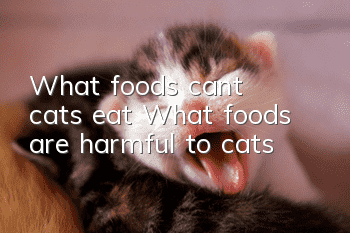What foods can’t cats eat? What foods are harmful to cats?

Alliums (onions, chives, etc.), garlic, leeks
Contains ingredients that destroy red blood cells in cats, which can cause anemia, hemoglobinuria, jaundice and other diseases. Excessive consumption can lead to the death of cats.
Milk, dairy products
Most cats are lactose intolerant. Their digestive systems cannot process dairy products, so feeding them will cause diarrhea.
Alcohol/All Liquor
Beer, spirits, wine, and food containing alcohol are not good for cats. Alcohol can cause vomiting, diarrhea and coma, and put a burden on the cat's internal organs. Just a little bit is enough to be lethal.
Grapes/raisins
Eating raisins can cause vomiting and kidney failure. Although this toxicity is mostly seen in dogs, the American Humane Society recommends not feeding them to pets due to their potential toxicity.
Coffee/chocolate/cocoa/tea
Because it contains caffeine, theobromine and theophylline, it can cause vomiting and diarrhea symptoms, seriously damage the heart and nervous system, and may cause shock and acute renal failure.
Raw beef/raw pork
Contains bacteria that can cause food poisoning. Pork fat globules are larger than other meats and may clog capillaries; in addition, pork may be infected with Ojeski virus. Raw beef is very good in terms of nutritional intake, but in addition to bacteria, the risk of parasites cannot be ignored.
Squid, octopus, crab and other crustaceans
Crustaceans such as squid, octopus and crabs can cause vitamin B1 deficiency in cats and are not conducive to their digestion. In particular, the hard shells of crustaceans can damage your cat's stomach.
Seafood such as abalone, conch, sardines and horsetail fish
Protein is not easily digested by cats, and it also contains toxins that can cause cat allergies. Big cats are more adaptable to this type of food, but eating too much will still cause symptoms such as allergies, salivation, vomiting, diarrhea, etc. In the case of kittens, severe cases may even cause convulsions and death. Sardines and horsetail fish in particular contain a strange toxin to which cats react particularly strongly. However, cats especially like this kind of food because of its strong fishy smell, and so do humans. Therefore, if we have high-quality seafood during our meals, we must not feed it to cats just because they are begging for food. Even adult cats can only feed a little bit, and don't cause pain to the cat because of your pampering.
Heated poultry bones
If heated poultry bones are eaten by cats, they may damage the digestive organs and may injure the teeth during the process of biting the bones.
Chili, pepper and other spicy seasonings
Strongly irritating spices can irritate the gastrointestinal tract, easily cause diarrhea, and put a burden on the liver and internal organs.
Sugary snacks, cakes and breads
Excessive intake of sugar and fat can lead to obesity and dental disease.
Raw eggs
Contains an enzyme called antibiotic protein, which will reduce the absorption rate of biotin (a type of vitamin B family, also called vitamin H), thereby affecting the health of the skin and coat. Raw eggs may also contain salmonella, which can cause bacterial infections.
A large amount of animal liver
A small amount of liver is not a problem, but eating too much animal liver can cause vitamin A poisoning, vomiting, diarrhea, dizziness, loss of appetite, fatty liver, and may also seriously affect the cat’s bones. Symptoms include bone deformities, bone growth in the elbows and spine, and osteoporosis. Vitamin A poisoning can also cause death.
Many nuts contain too much phosphorus and are not suitable for cats to eat. Walnuts are poisonous to cats. Macadamia nuts contain unknown toxins that can affect the nervous system and digestive system of dogs, causing muscle twitching and atrophy. Although there is no precedent for this in cats, Try to avoid it to be on the safe side.
Human medicine
One of the most common reasons cats are susceptible to poisoning is the fact that human drugs are subject to intake regulations. Just like with your children, keep all medications out of your cat's reach.
Poisonous plants
Lilies, hydrangeas, daffodils, delphiniums, hyacinths, golden kudzu, lantana, amaryllis, morning glories, cyclamen, bells, coleus, daisy leaves, desert roses , iris, iris, calla lily, poppy, lupine, asparagus, poinsettia (Christmas red), aloe vera, dieffenbachia, daylily, oleander, lily of the valley, mistletoe, thyme, beets, etc.; for the cat’s health It is absolutely safe. Do not touch other plants and flowers except cat grass.
Others
Such as leftovers eaten by humans, foods with added preservatives, seasonings, salt, and smoked and pickled foods.
Supplement: If the owner does not know whether the food prepared for the cat is edible, and when a dispute arises, for safety reasons, pleaseIf you don’t feed your cat, there must be many types of food that your cat can eat now.
- How to solve the problem of cats urinating everywhere
- What are some good ways to punish a cat that makes mistakes? Specialized in treating unconvinced kittens!
- What should I do if my kitten likes to scratch the furniture at home?
- What should I do if my kitten has fleas?
- How long does it take for a newborn cat to open its eyes?
- Cat hair loss mixed with white dander
- Can cats take amoxicillin anti-inflammatory drug?
- How to treat ringworm in cats with folded ears
- What is the range of a cat’s sense of smell?
- How to judge whether a kitten is healthy? Preliminary method to judge a cat’s health



